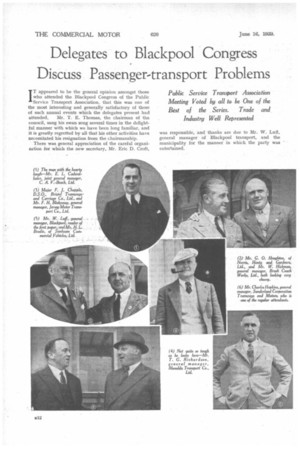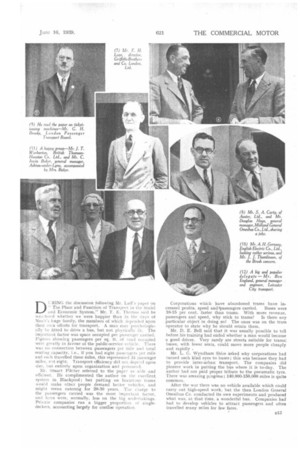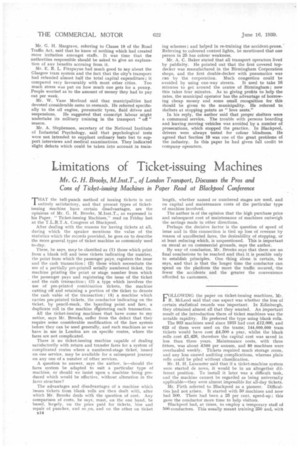Delegates to , Blackpool Congress Discuss Passenger-transport Problems
Page 46

Page 47

Page 48

If you've noticed an error in this article please click here to report it so we can fix it.
Public Service Transport Association Meeting Voted by all to be One of the Best of the Series. Trade and Industry Well Represented
IT appeared to be the general opinion amongst those who attended the Blackpool Congress of the Public Service Transport Association, that this was one of the most interesting and generally satisfactory of those of such annual events which the delegates present had attended. Mr. T. E. Thomas, the chairman of the council, sang his swan song several times in the delightful manner with which we have been long familiar, and it is greatly regretted by all that his other activities have necessitated his resignation from the chairmanship.
There was general appreciation of the careful organization for which the new secretary, Mr. Eric D. Croft, was responsible, and thanks are due to Mr. W. Lull, general manager of Blackpool transport, and the municipality for the manner in which the party was entertained.
Dl;RING the discussion following Mr. Luff's paper on " The Place and Function of Transport in the Social and Economic System," Mr. T. E. Thomas said he %welt-red whether we were happier than in the days of Noah's huge family, the members of which depended upon their own efforts for transport. A man may psychologically be fitted to drive a bus, but not physically lit. The important factor was space occupied per passenger carried. Figures showirg passengers per sq. ft. of road occupied were greatly in favour of the public-service vehicle. There was no connection between passengers per mile and total seating capacity, i.e., if you had eight passengers per mile and each travelled three miles, this represented 24 passenger miles, n:at eight. Transport efficiency did not depend upon size, but entirely upon organization and personnel.
Mr. Stuart Pilcher referred to the paper as able and efficient. He complimented the author on the excellent, system in Blackpool; but putting ou luxuries trams would make other people demand better vehicles, and might mean catering for 20410 Years. The charge to the passengers carried was the most important factor, and tares were, normally, less on the big undertakings. Private companies run a bigger proportion of singledeckers, accounting largely for costlisr operation.
Corporations which have abandoned trams have in
creased profits, speed andepassengers carried. Buses were 10-15 per cent, faster than trains. With more revenue, passengers and speed, why stick to trams? Is there any particular object in doing .so? The onus was on the tram operator to state why he should retain them.
Mr. D. E. Bell said that it was usually possible to tell before his training had ended whether a man would become a good driver. Very rarely are streets suitable for trams: buses, with fewer seats, could move more people cheaply and rapidly .
Mr. L. G. Wyndham Shire asked why corporations had turned such kind eyes to buses; this was because they had to provide inter-urban transport. The companies did pioneer work in putting the bus where it is to-day. The author had not paid proper tribute to the pneumatic tyre. There was amazing p:ogress; 140,000-130,000 miles is quite common.
After the war there was no vehicle available which could carry out high-speed work, but the then London General Omnibus Co. conducted its own experiments and produced what was, at that time, a wonderful bus. Companies had had to develop vehicles to attract passengers and often travelled many miles for few fares.
Mr. G. H. Margrave, referring to Clause 19 of the Road Traffic Act, said that he knew of nothing which had created more irritation amongst staffs. It was time that the authorities responsible should be asked to give an explanation of any benefits accruing from it. Mr. E. It L. Fitzpayne had much good to say about the Glasgow tram system and the fact that the city's transport had refunded almost half the total capital expenditure; it compared very favourably with most other cities. Too much stress was put on how much one gets for a penny. People worried as to the amount of money they had to pay out per week.
Mr. W. Vane Morland said that municipalities had devoted considerable sums to research. He referred specifically to the oil engine, pneumatic tyres, fluid drives and suspensions. He suggested that conscript labour might undertake its military training in the transport " off " season.
Mr. A. Stephenson, secretary of the National Institute of Industrial Psychology, said that psychological tests were not intended to supplant ordinary tests but to support interviews and medical examinations. They indicated slight defects which could be taken into account in train
ing schemes; and helped in re-training the accident-prone. Referring to coloured control lights, he mentioned that one person in 25 has colour weakness.
Mr. A. C. Baker stated that all transport operators lived by publicity. He pointed out that the first covered topdecker was manufac-Eured in the Birmingham Corporation shops, and the first double-decker with pneumatics was run by the corporation. Much congestion could be avoided by using one-way streets. It used to take 16 minutes to get around the centre of Birmingham ; now this takes four minutes. As to giving profits to help the rates, the municipal operator has the advantage of borrowing cheap money and some small recognition for this should be given to the municipality. He referred to shelters at stopping points as " love nests."
In his reply, the author said that proper shelters were a communal service. The trouble with persons boarding and leaving moving vehicles was avoided by a number of prosecutions, which stopped the practice. In Blackpool, drivers were always tested for colour blindness. He agreed that Section 19 was one of the great problems of the industry. In this paper he had given full credit to company operators.




















































































